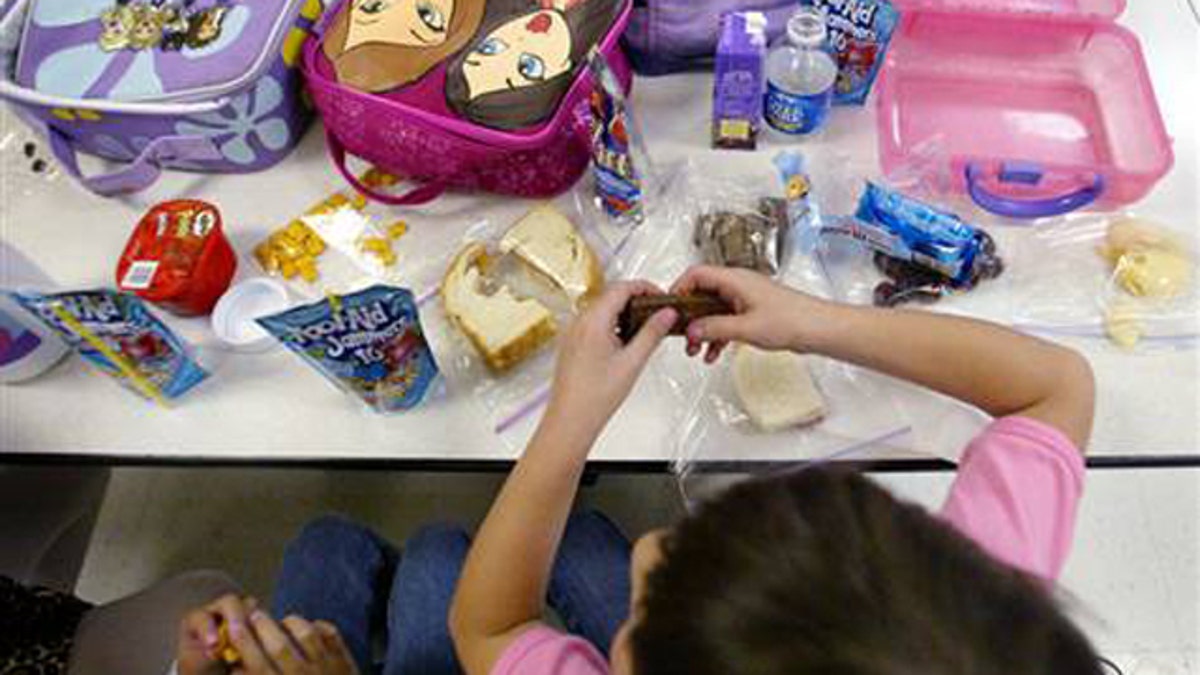
(AP)
It’s a good, old-fashioned food fight.
Parents in Louisiana who can afford to pay for their children's school lunch -- and whose kids go three straight days without paying -- will be reported to the state Department of Family and Children Services.
The kids won't go hungry. Under the new statute which began last week, sponsored by state Rep. Nancy Landry and passed unanimously over the summer, students who do not qualify for a free lunch and who do not have the money they need to buy one will be given -- at the minimum -- graham crackers and 8 ounces of milk.
And their parents will be held accountable.
“This is not about keeping full meals away from children,” Landry told FoxNews.com. “It’s making sure that children receive either a snack or meal while their parents are notified about the missing payments.”
But critics say the paperwork will be costly -- possibly more costly than paying for the school lunch. And they're angry that the taxpayers will have to foot the bill.
“It’s more taxpayers’ money going to state employees to baby-sit parents,” said Diana Duillory, a mother of three children in the Lafayette School District. “I know these irresponsible parents and it’s infuriating to me.”
But Duillory said she had mixed emotions. The deadbeat parents should be corrected, she said, but their children should not pay the consequences of being denied food. She said she knows many teachers who pay for their students' meals out of their own pockets because of neglectful parents.
Prior to the bill’s enactment, students who could afford to buy lunch could be turned away from the lunch line if their parents were delinquent with payments.
According to the U.S. Department of Agriculture, a school can decide not to provide free meals to children who are financially able to pay for them. So, technically, keeping food from children who can afford to buy lunch falls within federal guidelines.
The new bill does not impact children who currently receive free meals, according to the Louisiana State Department of Education. It is designed to put pressure on delinquent parents who pay for reduced or regular priced meals.
“The intention of this bill is to ensure that children are not denied meals while at school,” Melissa Sellers, the communications director for Gov. Bobby Jindal, wrote in an e-mail to FoxNews.com. "However, the part of this bill that includes reporting to DSS needs to be amended to line up with current law, which mandates school administrators to specifically report cases of child abuse or neglect."
Dr. Dana Bickmore, a professor at Louisiana State University’s School of Education, called the bill “backwards.” Bickmore, a former school principal, said the amount of money the system will save from lunches will be paid to workers filing paperwork for Child Services.
She said school lunch is an important issue, and the responsibility begins in the school districts, but “It seems like you're using a sledgehammer when a hammer will do.”
Landry said the bill serves a dual role: it helps schools keep an eye on parents who may be neglecting their children, and it gets children reduced-priced meals if they qualify.
“If a parent doesn’t take interest in their children’s eating habits, it certainly may indicate a problem at home with drugs or alcohol,” she said. And most school districts in the state have been following the bill’s logic even before its inception, said Renee Sherville, the child nutrition supervisor in the Lafayette Parish School System.
“This bill just forces us to do much more parental notification,” she said. “But most of its elements have been what we were doing in the first place.”
The schools have “habitual offenders,” she said. These students' parents are perfectly able to pay for their lunches, yet they owe hundreds of dollars. In 2007, these students accumulated a $240,000 bill. Each year, these districts have made gains in collecting the outstanding money, but nearly 16,000 meals have been served since August in Lafayette that remain unpaid, Sherville said. She said the prices range from 40 cents per meal to $2.25 in some districts.
“We’re building on a method that’s already working,” said Sherville. “We notify the parents quickly when we see a trend.”
Karen Martin, the president of Lafayette Parish Association of Educators, said the measure holds parents accountable.
“This new bill simply reminds parents to pay up,” she said. “And by notifying this agency, it will help us determine if there is a financial problem at home and then we can go from there.”
Martin, who taught high school in Lafayette for 30 years, said there are numerous reasons that fully capable parents don’t pay. But mostly, she said, it was because their children fail to inform them that they owe money.
“They lose the notices on the way home.” she said.








































